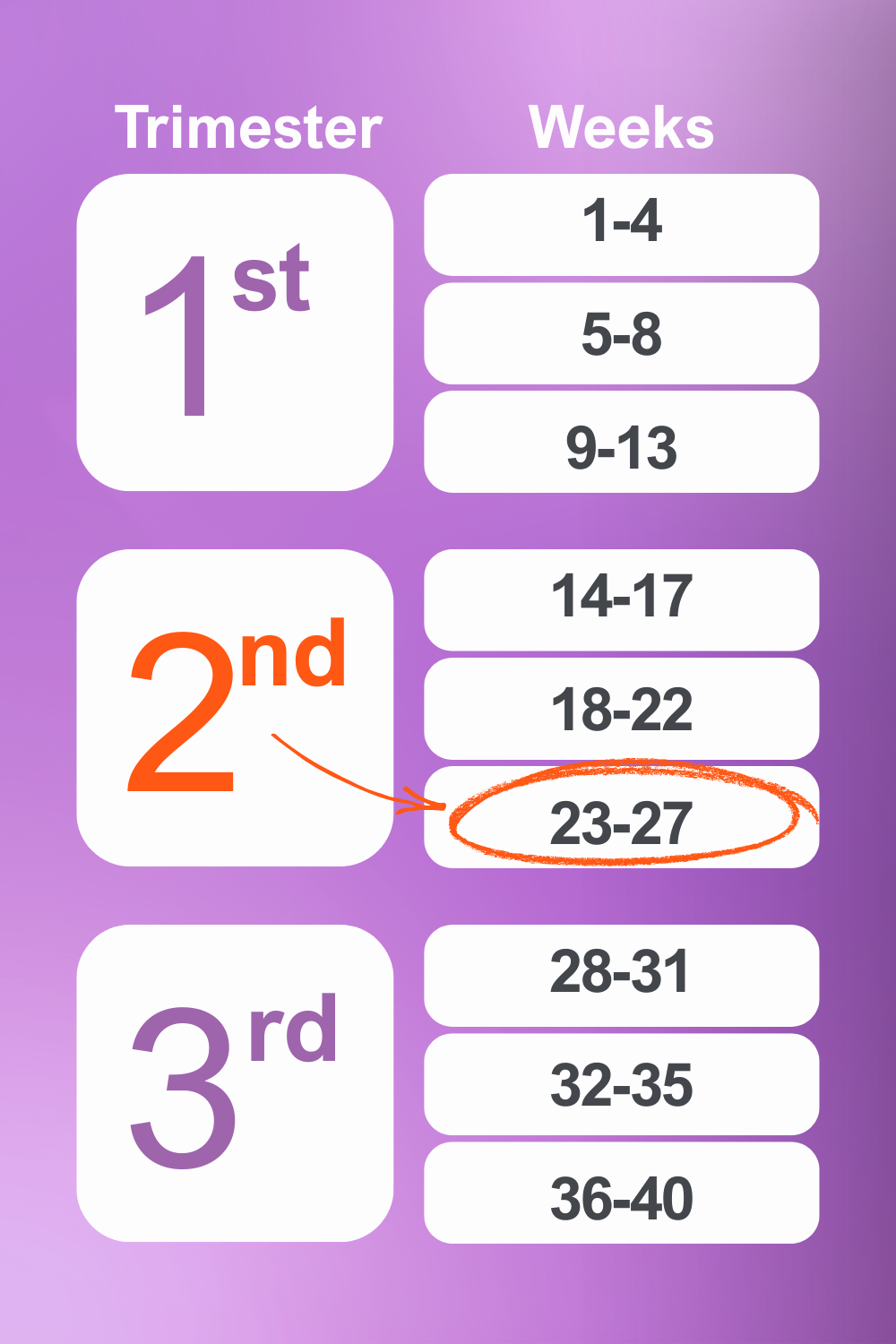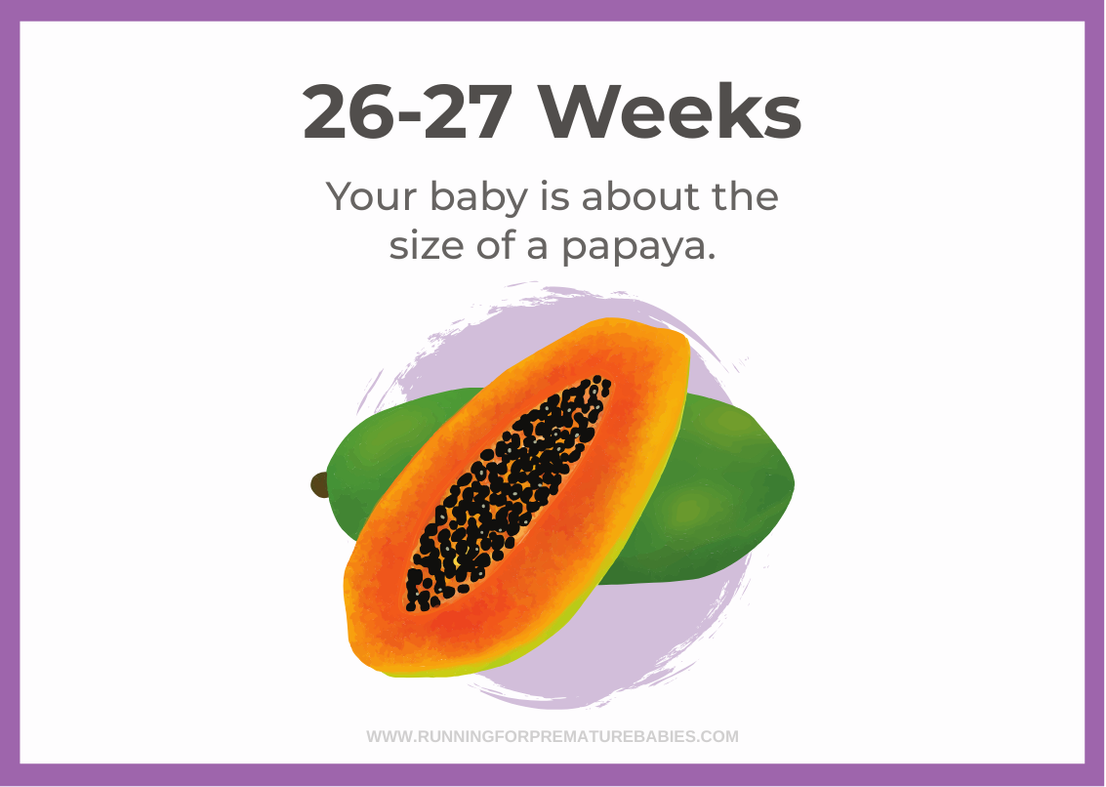Key Milestone Weeks in Pregnancy
Second Trimester

26–27 Weeks: Lungs produce surfactant, crucial for breathing after birth.
Summary:
At 26-7 weeks pregnant, your baby is showing exciting developments like opening their eyes, responding to sounds, and hiccupping. Your baby’s brain is becoming more complex, and their lungs begin producing surfactant, a vital substance that helps them breathe after birth. You may notice increased movement, swelling in your feet and hands, digestive discomfort, and Braxton Hicks contractions. Sleep can be disrupted by leg cramps or vivid dreams, and your belly button might pop out. It’s a good time to stay hydrated, eat fibre-rich foods, engage in gentle exercise, and prepare for more frequent prenatal visits as you approach the third trimester.
At 26-27 weeks pregnant, your baby is growing rapidly and becoming more active. They now weigh close to 1 kg and about 37 cm long. Their lungs are developing and beginning to produce surfactant, a crucial substance that helps the lungs expand and contract properly after birth. Surfactant's main role is to reduce surface tension within the alveoli - the tiny air sacs in the lungs - allowing them to stay open and function properly during breathing. Without surfactant, the alveoli would collapse, making it extremely difficult for a newborn to breathe independently.
The brain is also growing quickly, and your baby’s senses, such as hearing and sight, are becoming more refined. They can respond to light and sound, and their movements may feel stronger and more frequent. Fat and muscle are starting to build up, helping your baby look more like a newborn. The increasing fat layer under your baby’s skin will help regulate their body temperature after birth, aiding survival and comfort outside the womb.
At 26-27 weeks pregnant, your uterus continues to expand, shifting your centre of gravity and potentially affecting your posture and balance. You may experience more noticeable weight gain, stretch marks, and increased pressure on your bladder, leading to frequent urination. You may also develop melasma (dark facial patches) or acne due to hormonal changes. Wearing SPF daily and gentle skincare can help. Your abdominal muscles stretch to accommodate your baby’s growth. Braxton Hicks contractions might continue with mild, irregular tightenings of the uterus, as your body prepares for the third trimester and eventual childbirth.

At 26-27 weeks pregnant, your baby is growing rapidly and becoming more active. They now weigh close to 1 kg and about 37 cm long. Their lungs are developing and beginning to produce surfactant, a crucial substance that helps the lungs expand and contract properly after birth. Surfactant's main role is to reduce surface tension within the alveoli - the tiny air sacs in the lungs - allowing them to stay open and function properly during breathing. Without surfactant, the alveoli would collapse, making it extremely difficult for a newborn to breathe independently.
The brain is also growing quickly, and your baby’s senses, such as hearing and sight, are becoming more refined. They can respond to light and sound, and their movements may feel stronger and more frequent. Fat and muscle are starting to build up, helping your baby look more like a newborn. The increasing fat layer under your baby’s skin will help regulate their body temperature after birth, aiding survival and comfort outside the womb.
See FAQs Below
Get Involved
Run with us
Donate
Join the Premmie Marathon Challenge
FAQs
At 26-27 weeks can my baby hear me?
Yes, by 26-27 weeks pregnant, your baby can hear sounds from outside the womb. The foetal auditory system begins developing early in pregnancy, but it’s around 24-25 weeks that hearing becomes functional. Although sound is muffled and reduced by about half as it passes through the uterus, your baby can still detect voices, especially yours. In the third trimester, many newborns show signs of recognition and comfort when they hear familiar voices after birth. Midwives often encourage parents to talk or sing to their baby during this stage to help foster bonding and early sensory development.
Why do my ankles swell?
At 26-27 weeks pregnant, swelling in your ankles is common and usually a normal part of pregnancy. This happens because your body is carrying extra fluid, your hormones soften vein walls, and your growing uterus presses on veins, especially those that return blood from your legs to your heart. These changes cause blood to pool in your lower limbs, and some of it leaks into surrounding tissues, leading to visible swelling.
Swelling often worsens later in the day and improves overnight. While mild swelling is expected, sudden or severe swelling - especially in your face, hands, or one leg, can be a sign of serious conditions like pre-eclampsia or venous thromboembolism and should be checked by a healthcare provider.
Tip: To help reduce swelling in your ankles, try elevating your legs when resting, avoid standing for long periods, and sleep on your left side to improve circulation.
At 26-27 weeks pregnant how do I deal with constipation or heartburn?
At 26-27 weeks pregnant, constipation and heartburn are common due to hormonal changes and the physical pressure of your growing uterus.
Constipation affects up to 2 in 5 pregnant people and is caused by:
- Hormonal shifts (especially progesterone) slowing digestion.
- Iron or calcium supplements.
- Reduced physical activity.
- Low fibre intake.
Relief tips:
- Drink 7-8 glasses of water daily.
- Eat high-fibre foods like wholegrains, fruits, and vegetables.
- Practice good toilet habits: don’t delay going, use a footstool, and relax your abdominal muscles.
- If needed, ask your doctor about safe fibre supplements or laxatives.
Heartburn is caused by:
- Relaxed stomach valve due to progesterone.
- Uterus pressing on the stomach, pushing acid into the oesophagus.
Relief tips:
- Eat small meals slowly.
- Avoid lying down after eating.
- Limit trigger foods: spicy, fatty, citrus, chocolate and caffeine.
- Sleep with your head elevated or on your left side.
- If symptoms persist, antacids or other medications may be recommended by your doctor.
Why do I have leg cramps or haemorrhoids?
At 26-27 weeks pregnant, leg cramps and haemorrhoids are common and often uncomfortable symptoms caused by the physical and hormonal changes your body is undergoing.
Leg cramps, especially in the calves, affect up to 3 in 10 pregnant people and are more frequent at night during the second and third trimesters. While the exact cause isn’t fully understood, contributing factors include:
- Weight gain.
- Pressure on nerves and blood vessels.
- Poor circulation.
- Vitamin or mineral deficiencies (e.g., magnesium or calcium).
To relieve cramps, try stretching your legs before bed, staying hydrated, walking, or using a heat pack. If cramps persist or are severe, consult your doctor.
Haemorrhoids are swollen veins in the rectum or anus, often triggered by:
- Increased pressure from your growing uterus.
- Higher blood volume.
- Constipation and straining during bowel movements.
They can cause pain, itching, or bleeding. To manage them, eat a high-fibre diet, drink plenty of water, avoid straining, and use warm baths or ice packs. In some cases, safe creams or laxatives may be recommended. Haemorrhoids usually improve after birth and don’t affect your baby.
When should I stop flying?
At 26-27 weeks pregnant, flying is generally considered safe for most people, especially if you’re having a healthy pregnancy. In fact, the second trimester is often the most comfortable and safest time to travel. However, as you approach the third trimester, airlines may begin to restrict travel. Some require a doctor’s letter confirming your due date and that it’s safe for you to fly.
You should check with your airline as rules vary between domestic and international flights. International airlines may have earlier travel cutoffs than domestic ones, so always check their policy before booking. Also, speak with your doctor or midwife before booking, especially if you have any complications or risk factors. Flying increases the risk of deep vein thrombosis (DVT), so staying hydrated, wearing compression stockings, and walking or stretching during the flight are recommended.
Related reading:
First Trimester
What to expect when you're 3-4 weeks pregnant
What to expect when you're 5 weeks pregnant
What to expect when you're 6-9 weeks pregnant
What to expect when you're 10 weeks pregnant
What to expect when you're 12 weeks pregnant
What to exprect when you're 14 weeks pregnant
Second Trimester
What to expect when you're 18 weeks pregnant
What to expect when you're 20 weeks pregnant
What to expect when you're 22-23 weeks pregnant
What to expect when you're 24 weeks pregnant
What to expect when you're 26-27 weeks pregnant
Third Trimester
What to expect when you're 28 weeks pregnant
What to expect when you're 29 weeks pregnant
What to expect when you're 30 weeks pregnant
What to expect when you're 32-33 weeks pregnant
What to expect when you're 34 weeks pregnant
What to expect when you're 36 weeks pregnant
What to expect when you're 37 weeks pregnant
What to expect when you're 38-40 weeks pregnant
If you would like to run with us, either in memory of a precious baby, to celebrate new life, or simply to add purpose to your fitness journey, click here to find out how you can help give babies a better chance of survival.
Peacock, A. (2018, November 30). What the health: Can babies hear and recognise voices in the womb? Faculty of Health and Behavioural Sciences, University of Queensland, from https://habs.uq.edu.au/article/2018/12/what-health-can-babies-hear-and-recognise-voices-womb . Retrieved 15th August 2025
Pregnancy, Birth and Baby. (n.d.). Leg cramps during pregnancy. Australian Government Department of Health and Aged Care. from https://www.pregnancybirthbaby.org.au/leg-cramps-during-pregnancy retrieved 15th August 2025
Pregnancy, Birth and Baby. (n.d.). Haemorrhoids during pregnancy. Australian Government Department of Health and Aged Care. from https://www.pregnancybirthbaby.org.au/haemorrhoids-during-pregnancy. Retrieved 15th August 2025


